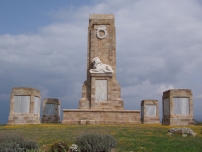| First Name: | Ernest Walter | Last Name: | LODGE | |
|---|---|---|---|---|
| Date of Death: | 24/04/1917 | Lived/Born In: | Brentford | |
| Rank: | Private | Unit: | Wiltshire7 | |
| Memorial Site: | 1. Brentford Memorial 2. Doiran Memorial, Greece | |||
Current Information:Age-28 259, High Street, Brentford
In the autumn of 1915, Allied forces landed at Salonika in Greece. They had been despatched there to deter Bulgaria from joining in the German and Austro-Hungarian attack on Serbia and they were not expected to remain long. But this was not to be. Bulgaria became allied to the Central Powers, Serbia was overrun and it was decided to keep an allied force of mainly French and British troops on the Salonika front, where they stayed for the rest of the war. At its peak, the British Salonika Force (BSF) numbered 220,000 men. During 1916 and 1917 fighting along the 250 mile front was sporadic, with long periods of inertia punctuated by incidents of sometimes intense fighting. The biggest threat to the men of the Salonika Force was not the Bulgarians but disease, especially malaria, which in the summer months was rampant in the Struma Valley, so much so that at times both sides withdrew to the hills to escape it and fighting came to a standstill.. The weather was cruel as well with boiling hot summers and freezing winters. The campaign lasted through to September 1918 when a sustained attack by French, British and Serbian troops forced Bulgaria out of the war. In 1916 and 1917 the Allies went on the offensive and from 24th April until 9th May, 1917, the BSF fought the First Battle of Doiran which ended in failure and cost the British over five thousand casualties. 26th Division were engaged in this operation which took place around Doiran Lake. On 24th April, 79 Brigade attacked from the lake to Petit-Couronne on the Doiran-Varder front, a very tough nut to crack. The Bulgarian defences here were formidable and the British bombardment had done little damage to them. Their trenches had been blasted from solid rock, their wire was uncut and their guns not silenced. It is difficult to understand why this sector had been chosen for an attack but General Sarrail insisted on it especially as he was not using French troops. At 9.05pm the 7th Wiltshire battalion attacked with three of its companies. 'A' Company went down the Patty Ravine in file and formed up on the north-west slope. The enemy put up a very heavy trench mortar barrage in the ravine during the whole of this time, which caused many casualties. The company crawled up the slope in line and having got to the top advanced to the wire. Gaps had been cut but, owing to machine-gun fire on the left, heavy rifle fire all along the line and the resistance put up by the enemy's bombers, it was impossible to get into the trenches. The advance was held up and the company was forced to lie down in shell holes in front of the wire. The main party never got through the wire and the few who got into the enemy trenches were not seen again. By this time all the officers had become casualties and the company were ordered to withdraw. 'C' Company formed up at 9.15pm and when the protective artillery barrage lifted they entered and cleared the enemy trenches. However, because of lack of support on their left flank, where 'D' Company had been held up and in the face of a vigorous enemy counter attack, ‘C’ company were forced to evacuate the enemy's lines. They too were then ordered back to their starting line. 'D' Company left their lines at 9.26pm and although the first two attacking waves got through the wire along the Bulgarian first line, they were held up by the wire in front of the second line, which had been insufficiently cut. The enemy trenches were packed with bombers who had a great positional advantage as the men of ‘D’ Company struggled but failed to get through the wire. Three times they tried but on each occasion were brought to a standstill. In these circumstances they had no alternative but to withdraw. 7th Wiltshire suffered over three hundred casualties during this failed operation, one of whom was Ernest Lodge. |
||||
| « Back to Search Results | ||||
| If you think any of the information shown here is incorrect, Click Here to submit your amends and comments | ||||




